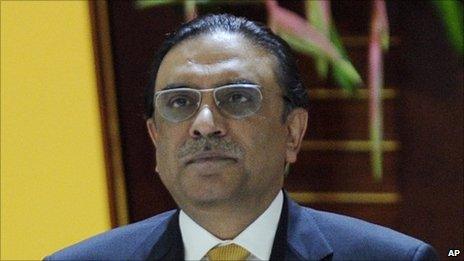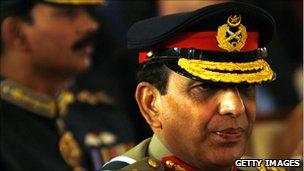Leaks paint picture of unreliable and unstable Pakistan
- Published

One cable suggests President Zardari feared for his future
Senior political and military figures in Pakistan have been in no hurry to answer their phones since the latest round of leaked documents from Wikileaks. Who could blame them?
The picture that emerges from the cables (as quoted by newspapers working with Wikileaks) is of an unreliable and unstable nuclear-armed nation, still supporting militant groups, with a president worried about being pushed out by the army.
The cables reveal deep international anxiety about Pakistan's nuclear materials falling into the wrong hands - concerns shared by Britain, the US and Russia.
Pakistan's foreign ministry has responded with a brief and blunt statement. "The fears are misplaced, and doubtless fall into the realms of condescension," said spokesman Abdul Basit. "There has not been a single incident involving our fissile materials, which clearly reflects how strong our controls and mechanisms are."
It is those controls and mechanisms which worry the international community. According to the leaks, Russia believes there is no way to guarantee the loyalty of all staff working in Pakistan's nuclear programmes - who Russia believes may number as many as 130,000.
The US is worried that "someone working in government could smuggle enough material to eventually make a weapon", according to a cable from the former US ambassador to Pakistan, Anne Patterson.
But that risk exists in all nuclear states, according to a retired military insider - the former deputy head of the Pakistan air force, Air Vice Marshall Shahzad Choudry.
He argues that Pakistan's nuclear safety record speaks for itself. "Pakistan has had nuclear capacity since 1985," he says. "Since then, Pakistan has been able to hold on its assets and take care of them. There are layers and layers of safeguards".
Political deals

Army chief Gen Ashfaq Parvaz Kayani is said to have considered replacing the president
The nuclear worries are old news, but the leaks shed new light on the precarious state of democracy here, with accounts of dark dealings in high places.
The cables suggest the army chief, General Ashfaq Parvaz Kayani, at least considered replacing the president during a political crisis in early 2009.
Gen Kayani is said to have hinted he might have to "persuade" President Zardari to resign, though the government would remain in place - a sort of coup lite.
He is reported to have discussed the issue in a meeting with Ms Patterson, at which he admitted he "disliked" the president. The feeling may well be mutual.
Pakistan's leader feared for his future, according to another cable. He is said to have told US Vice-President Joe Biden last year that Gen Kayani might "take me out".
The beleaguered president is reported to have made extensive contingency plans in case he should be assassinated like his wife before him. He has instructed his son Bilawal to name his (President Zardari's) sister, Faryal Talpur, as president. And he has asked the United Arab Emirates to shelter his family in the event of his death.
The leaks accuse the Pakistan military of double-dealing in the fight against militancy - another familiar charge.
The US believes the military is still providing covert support to militant groups targeting Afghanistan and India. Former ambassador Patterson warned there was "no chance" of this support being withdrawn, in spite of billions of dollars of US aid.
US drone strikes
In domestic political terms, some of the most damaging material may be about the government's stance on the controversial CIA drone programme, targeting militants in the tribal belt.
In public, officials oppose the drone strikes - which have killed hundreds, including an unknown number of innocent civilians. In private, it is a different story, according to a cable from Ms Patterson. It says Prime Minister Yousaf Raza Gilani had no objections to a planned drone attack.
"I don't care if they do it, as long as they get the right people," he said. "We'll protest in the National Assembly [parliament] and then ignore it."
Another cable says that Islamabad authorised 12 US commandos to work on the ground in the border areas, advising its troops. That will not go down well here, where anti-Americanism is rife.
The Pakistan army has refused to comment on the latest material from Wikileaks. But in an earlier briefing to local media, a top military official said Pakistan had moved from being "the most-sanctioned US ally to being the most bullied."